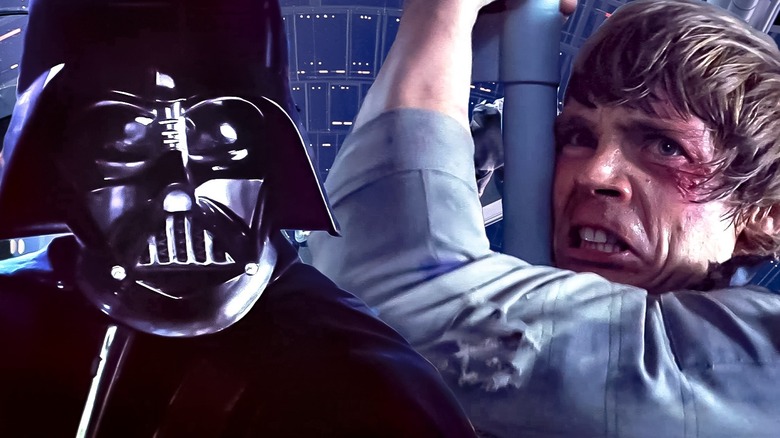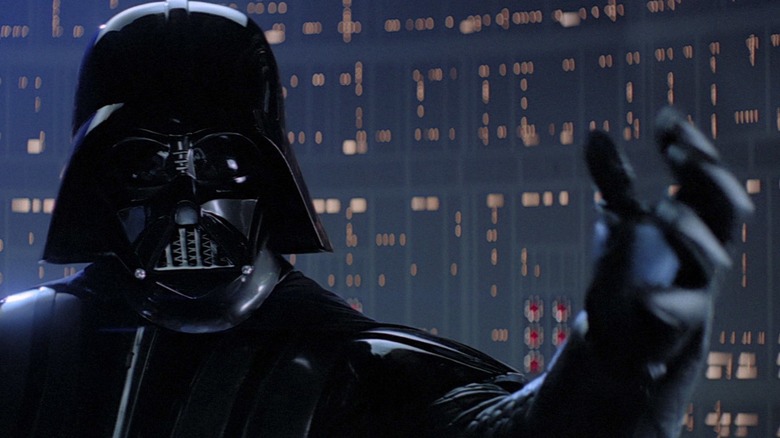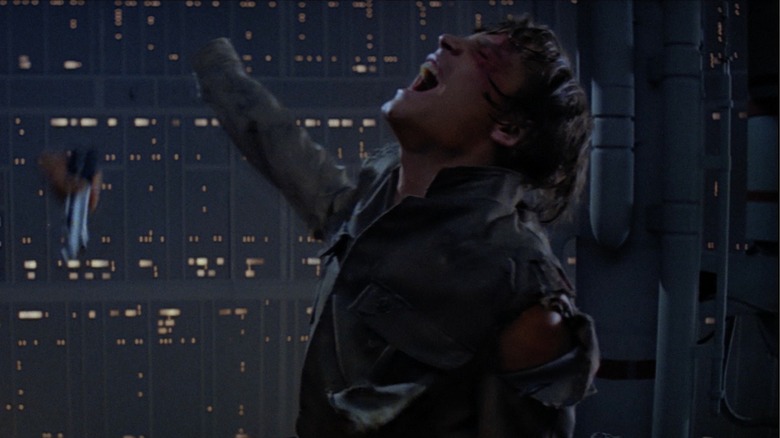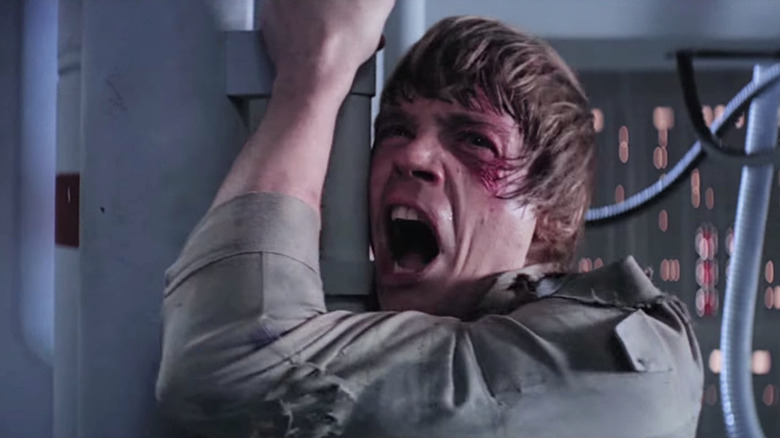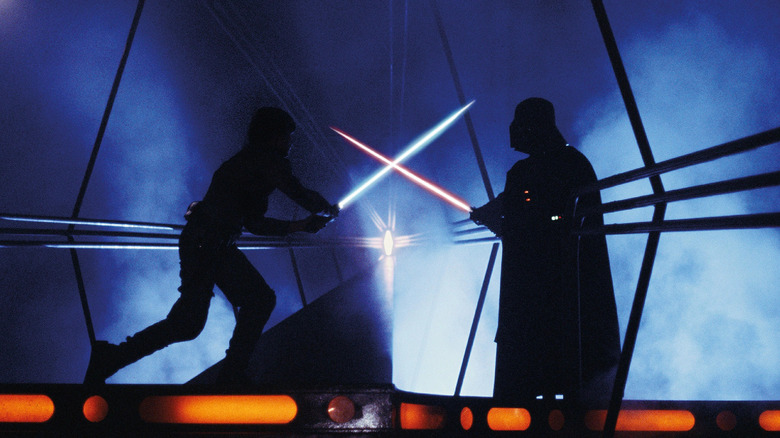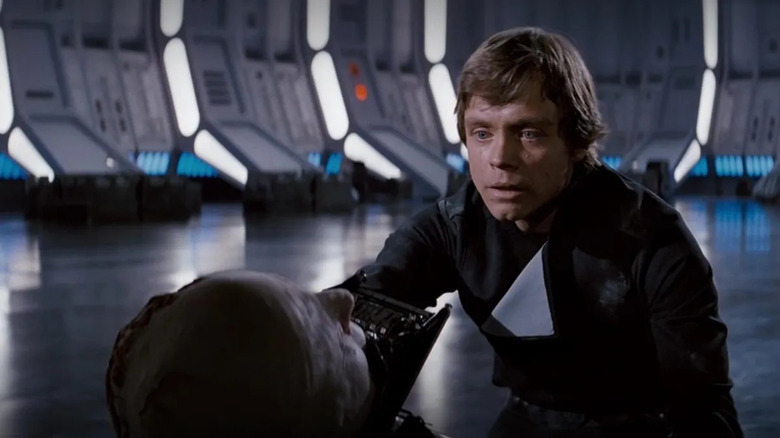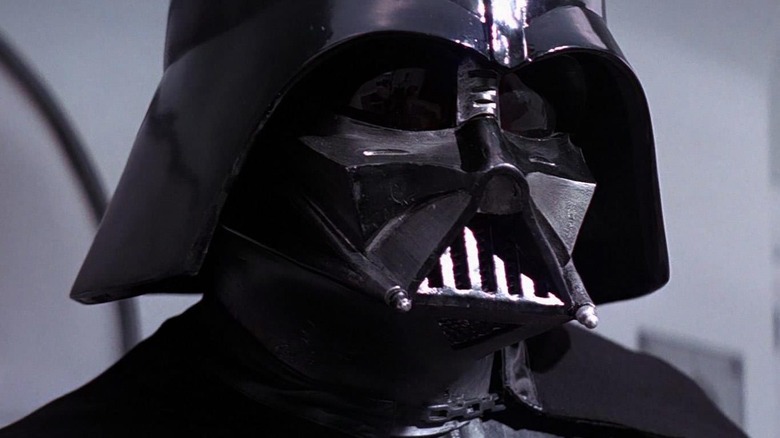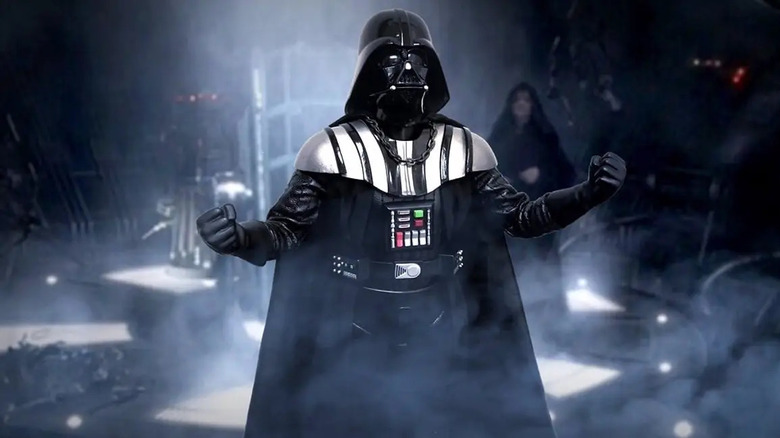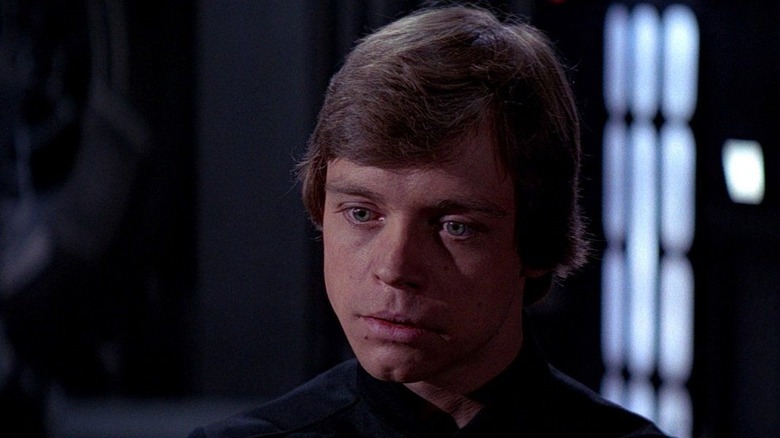Things Only True Fans Noticed About Star Wars' Iconic 'I Am Your Father' Scene
There's one "Star Wars" quote that pretty much anyone can paraphrase whether they've seen the films or not. Though Darth Vader's (David Prowse, James Earl Jones) "I am your father" bombshell is collectively misremembered by a good chunk of "Star Wars" fans and casual observers alike, most people these days are aware of this plot twist before they ever see the movies.
Fans in the '70s had the least spoiled reaction to "The Empire Strikes Back" scene that has since become one of the most iconic twists in cinematic history. Unfortunately, unless you watch the "Star Wars" films really young, most kids know that Vader is Luke Skywalker's (Mark Hamill) dad long before they become fans. And while we've all heard this line parroted dozens of times — from schoolchildren and grandparents alike — there's much more than meets the eye (and ears) when it comes to this scene.
It may only be a few minutes long, but there's a rich tapestry of parallels and small details that only true fans notice when it comes to the "I am your father" scene in "Star Wars." There's a lot to unpack, whether it's similarities between Anakin and Luke, nuances that take a few rewatches to catch, or even the line itself.
Collectively misremembering an iconic quote
Okay, who's heard someone misremember the iconic line as "Luke, I am your father"? On some level, it makes sense that so many people collectively insert a "Luke" into Vader's revelation. Heck, plenty of people even tack on a "come to the Dark Side; we've got candy" at the end of the reference — and that certainly isn't in the movie.
Yet without the Luke context, the quote packs less of a punch. Sometimes, quotes just take on such a life of their own that people seem to forget the original. Let's face it: Most people have heard the line incorrectly referenced by friends, family, and even strangers more often than they've seen "The Empire Strikes Back." As a result, the butchered version of the line is fresher in fans' minds than the actual scene. It's just one of those quirky human things that happen. Just ask the Berenstain Bears (or is it actually the Berenstein Bears)?
The real-world term for these collective hiccups is the Mandela Effect which essentially posits the possibility of an alternate universe that we're seeing glimpses of in our own reality. And sure, alternate universes sound cool, and all, but simple explanations are usually the right ones.
The right hand Skywalker men
When it comes to the Skywalker men, losing a right hand is actually a right of passage. Back when George Lucas wrote "The Empire Strikes Back," he probably didn't foresee giving Anakin Skywalker (Hayden Christensen) the same affliction decades later in the prequels. Yet both Luke and Vader share enough similarities in their personalities and the temptation to join the Dark Side that it only makes sense for them to share a physical trait linked with pain.
Anakin is a cautionary tale of what happens when you give in to hate. Alternatively, Luke faces similar impulses and moments of loss, but he fights against his urges to resort to hate and chooses to be a better person. Whether it's spurning his father in the original trilogy or stopping himself from hurting Kylo Ren (Adam Driver) in the sequels, Luke makes the better choice.
However, there's even more nuance to their shared amputations. When Count Dooku (Christopher Lee) cuts off Anakin's hand in "Revenge of the Sith," it kicks off the sequence of events that turn Anakin into Vader. Pain has always been Anakin's weakness on his path to the Dark Side — both physical and emotional. At this moment, Vader is likely trying to recreate the events that led to his own downfall so that his son can join him. The 12th issue of "Star Wars: Darth Vader" even corroborates this theory. Vader chooses to endure the pain of his rebuild because he believes pain is power and the lynchpin to the Dark Side.
No one can tolerate this Skywalker drama
No one wants to say this out loud, but the other patented trait the Skywalker men share is being absolute drama queens. These boys just love to scream the word "no" in an overzealous fashion that would make most drama teachers' eyes roll. Yet they all do it — every single one. While we don't get Anakin's transformation into Vader until the tail-end of "Revenge of the Sith," chronologically speaking, our immaculate conception of Skywalker first coins this particular trait.
Palpatine (Ian McDiarmid) lies to Anakin, insisting that he not only killed Padmé (Natalie Portman) but also his unborn child. Of course, the newly minted Vader's reaction is screaming the word for so long that it feels eternal. Of course, fans first see Luke reacting like this in "The Empire Strikes Back" when Vader reveals his shared lineage with Luke. Like clockwork, Luke screams "no" for an equally unreasonable amount of time — while it sounds like someone is filleting his insides. He didn't even have that intense of a reaction to his amputation.
But wait, we're not done — enter Kylo decades later. This Skywalker quirk must get amplified with each passing generation because Kylo angrily elongates just about every word he says. Upon learning that Luke is a Force projection distraction during their battle in "The Last Jedi," Kylo lets off the classic Skywalker "no" — paralleling his uncle's, which also occurred during the second film in their respective trilogies.
Darth Vader's not-so-secret motivation
There's one thing that doesn't change between Anakin's plight as a Jedi and his descent to the Dark Side as Darth Vader: he wants a family. Neither Vader nor Anakin deserves excuses for their horrendous actions, but seeing what a lack of love has done to this once-sensitive boy is genuinely tragic. Obi-Wan Kenobi (Ewan McGregor) insists that "Only Siths deal in absolutes," but the entire Jedi brand is built on forcing down emotions and not letting love in. If you ask Anakin, that's pretty absolute.
Anakin continually searches for acceptance, whether from the Jedi Council or Palpatine — only to be spurned by both parties. Padmé is the only one who truly loves and accepts him, but it's not enough. During Vader's parental bombshell, he tells Luke, "Together we can rule the galaxy as father and son." Yet before he fully turns into Vader, Anakin tells Padmé in "Revenge of the Sith" that "Together, you and I can rule the galaxy." He gets spurned on both occasions because family or no family, Padmé and Luke aren't signing up for the OG Skywalker's torture fest.
But at the end of the day, Vader is still searching for family long after he embraces the Dark Side. In both instances, Vader mentions betraying Palpatine, proving that his master is just a stand-in for the true family Darth desperately wants. He just goes about it in that classic self-destructive Skywalker way — taking everyone down with him.
Searching Luke's mind for the truth
Given that younglings spend over a decade honing their relationship with the Force before seeing many results, it's no surprise that Luke isn't exactly Yoda's (Frank Oz) star student on Dagobah. Even Anakin getting thrown into the Jedi mix at 9 years old was considered too late by most Jedi standards. Fans could even argue that Anakin's descent to the Dark Side is a direct result of his formative years existing outside of the tutelage of strict Jedi thinking.
Regardless, Luke has to cram over a decade of practice into a few years. As a result, half of the time that Luke uses the Force between episodes IV and V, he doesn't know that he's doing it. When Vader comes clean to Luke about their shared lineage, Luke uses the Force to sense that Vader is telling the truth. Vader says to Luke, "Search your feelings. You know it to be true." Of course, Vader is vague on the logistics of this command because Luke's ignorance is his father's power.
Vader may not say it in so many words, but he's really telling Luke to use the Force to sense his connection with Darth — the same way the Sith Lord detected his relation to his son. Vader wants Luke to come to his own conclusion because he knows his son won't take his word for it. By coaxing Luke to use the Force in a moment of betrayal, he's hoping Luke's anger and Force use will tip the scales to the Dark Side.
The power of the Dark Side
Villains have a nasty habit of leaning into their bad choices even when they have a nagging realization that they're doing the wrong thing. As long as they convince themselves their actions are unavoidable, they don't have to face the destruction they've left in their wake. On some level, Vader knows that he's expendable to Palpatine. So Vader's revelation to Luke that he's his father is a step toward one goal: Taking out good ol' Palpy and ruling with his son.
Every calculated move Vader makes in this scene serves that mission, including when he tells Luke, "If you only knew the power of the Dark Side." In this instance, he's referring to the Dark Side's power being something positive to attain. But even Vader barely believes it. Alternatively, when Luke tries to convince his father to ditch the Dark Side in "Return of the Jedi," Vader says, "You don't know the power of the Dark Side." But in this instance, Vader admits that he chose the wrong path and confesses that the Dark Side has too much of a hold on him to go back.
They're almost identical quotes but they have vastly different meanings. Anakin, and then Vader, had to convince himself that the Sith's power was worth it because otherwise, he believed he killed his wife and child for nothing. Yet even after he discovers that his children are alive, he can't reconcile with that reality until he's on his deathbed.
A dictator's delusion
Speaking of delusional behavior, Vader is still going strong when he tries to justify his politics. Sadly, Padmé's passion for democracy didn't rub off on her husband. While Anakin helps Palpatine overthrow the senate, Padmé laments its demise, saying, "So this is how liberty dies ... with thunderous applause." The quote is one of the most powerful moments in the franchise, but Vader is still parroting Palpatine's lies two decades later.
During Vader's attempt to turn Luke, he tells his son that combining forces will end this destructive conflict — despite "this conflict" existing solely because of Vader and Palpatine's actions. Vader still deludes himself into thinking that he's politically in the right. Not only is Darth responsible for nearly wiping out the Jedi with Order 66, he never shies away from slaughtering people (or children) who don't blindly follow the Empire. Chillingly enough, Vader has convinced himself that he doesn't want all of the casualties that war brings despite being its cause.
Fearmongering is par for the course when it comes to dictatorships. Vader turns the Rebels into Public Enemy Number One because he and the Empire need a scapegoat — a common enemy — to manipulate the masses. The scariest villains are often the ones who take part in genocide to feed some false altruistic motive. Why? Because these insidious people exist in real life. Except real megalomaniacs don't need the Force or Infinity Stones to litter the streets with bodies.
Ignoring the high ground
We don't fully learn about the slightly absurd concept of the Jedi high ground until the prequels, but it's canon nonetheless. Though George Lucas isn't exactly known for stellar continuity (*coughs* Leia and Luke's makeout scene), each added piece of the universe's puzzle matters.
Vader has the high ground in almost every moment of the revelation scene. Luke and his father's duel even starts out with Darth's saber pointed directly at his son's throat. The Sith Lord has the kill shot long before he spills the paternal beans. And from this moment on, Vader towers above Luke. Yet instead of taking Luke out, Vader tries to convince Luke to join him. After the "I am your father" moment, Vader makes a fist while Luke cowers below him. He can easily Force choke Luke here. When Luke refuses to join Vader in the Dark Side, Vader's hand is even outstretched. So you're telling us that Darth "I can literally fly" Vader can't use the Force to levitate his son from falling?
Instead, Vader lets Luke go. The Sith Lord seems to be phoning it in to talk to Luke and let him process the bombshells from the very beginning of the scene. Vader likely knows he won't get through to Luke with a simple conversation, but he meticulously bolsters Luke's confidence in his power in a way that's just believable enough. What can we say? Vader likes to play the long game.
